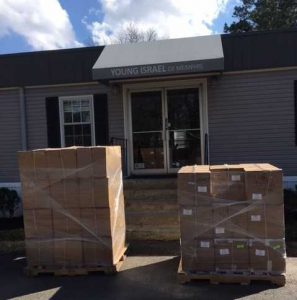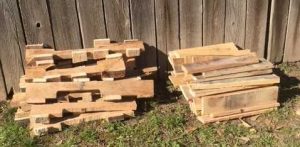With Pesach (Passover) just around the corner, there is much that needs to be done to prepare for the yom tov (holiday). Today (Thursday, 3/22/18) was a beautiful sunny day, and as I used a power saw to cut up two wooden shipping pallets, I smiled to myself as I considered the Jewish significance of what I was doing.
Allow me to explain. Next Friday night, Jews all around the world will gather for their (first) Pesach Seder. Families and friends will recount our national history, relive the Exodus from Egypt, and participate in a variety of traditions that will create powerful memories for all involved – especially the children.
Earlier on that Friday, we will also burn some of our chometz (leavened products), as we transition to eating matzah in its place for the next eight days. What combustible items are used in the burning of that chometz? In addition to the wood that will fuel those small fires, there is another item that is traditionally used for this mitzvah – our dried up lulavim (palm branches) from the festival of Sukkos. In their previous lives, those items were essential to our celebration of Sukkos around six months ago. There is an ancient Jewish custom to let those items dry out. In order to do this, one must remove them from their plastic bags after Sukkos, or else they will become moldy. They are then used as kindling for of our pre-Pesach chometz burning.
What is the rationale for this custom? Our Sages explain, that since those items were already used once for a mitzvah, rather than simply dispose of them, we should try to see if there’s one last mitzvah for which they can be used. ‘Recycling’ them as fuel for burning our chometz before Pesach was seen as the perfect way to use those items for one final mitzvah.

While our dried up lulavim can certainly add to the flames needed to burn our pre-Pesach chometz, I realized that we’ll need other wood to serve as the main fuel for that fire. Should I go out and purchase firewood? Then it hit me. Young Israel of Memphis had coordinated the purchase and shipping of close to 240 pounds of hand-made shmurah matzah for our local community. All of that matzah was delivered on two wooden pallets. By Thursday, pretty much all of that matzah had been picked up by those who ordered it, and those lonely looking empty wooden pallets were sitting near the synagogue’s trash, just waiting to be disposed of.
In a sense, those pallets had just been used for a mitzvah – after all, they played a role in supplying our community with matzah that would be used at the Pesach Seder (and beyond) in so many local homes. Why should we simply discard those wooden pallets with the trash when an opportunity to perform one last mitzvah with them would present itself in just another week? Those pallets would be the perfect fuel for YI’s pre-Pesach chometz burning!

After a quick run to Home Depot’s tool rental department to procure a small (but powerful) electric saw, I found myself in Young Israel’s parking lot cutting those two wooden shipping pallets down to size as part of my Pesach preparations. Next week, along with our dried-out lulavim, they will enable us to perform the mitzvah of burning our chometz before Pesach. Those wooden pallets have been recycled, and will soon be used in the performance of one more mitzvah.
This teaching of our Sages is obviously not limited to dried-out lulavim and wooden shipping pallets. The more ways we find to engage in the performance of mitzvos, the more our own lives will be enriched.
The words of this author reflect his/her own opinions and do not necessarily represent the official position of the Orthodox Union.

